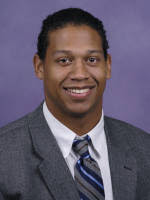 "This d-end is pwning me. Using nommo, I am going to speak will to power and transform this into a reality where I have the upper hand. Or I am going to illegally cut block him ... whatev ..."
"This d-end is pwning me. Using nommo, I am going to speak will to power and transform this into a reality where I have the upper hand. Or I am going to illegally cut block him ... whatev ..."This morning on ESPN's "The Mayne Event" -- a fantastic satirical segment, narrated by reporter Kenny Mayne, which intersects folly and barbarity in professional football in a way that few can -- Daryn Colledge, a guard for the Green Bay Packers, was featured. Colledge, a 6'4", 299 guard from Boise State U. remarked on his teammates' misperceptions of him, stemming from the fact that he is from the North Pole (ok, a North Pole, the one in Alaska) and that his last name is "Colledge." His teammates, of course, assumed that he loves santa claus and that he loves higher education.
Like Charlie Murphy say ... "Wrong!" And in one moment, the two of the loves of my life -- Rhetoric and Athletics -- intersected briefly, if unfortunately, as Colledge disspelled the myth about his love for higher learnin'. And I quote:
"I hated college. What the hell does theory of rhetoric have to do with me? I block people for a living."
Drs. Estrem and Peele (BSU's Writing Program coordinators) must be proud.
What made it worse is that this segment followed one about LaDanian Tomlinson, where they did a feature on how he "sets up blocks," or affects postures, while running, that convince defenders to take angles against him that they believe will be effective, but ultimately are not. To the point that they have been wrong an NFL record 31 times this year. This is not simply athleticism, as there are many people in the world who are better athletes than Tomlinson. His success this year has been because he has a psychological edge over his competitors, as well, and one that is created by how he uses his body to persuade defenders that they have a shot at hime when they really don't.
This of course hearkens back to scenes described by Deb Hawhee in Minding the Body, (and to a lesser extent Gardner's work on multiple intelligence theory, kinesthetic intelligence being one that he profiles) where, in ancient Greece, rhetoric and athletics were taught in the same spaces. The gymnasium was a place not only for athletic training, but a place for engaging in social and intellectual pursuits (if you could imagine teaching your writing class in the McKale Center while Lute Olson clamored for better defense in the background).
Colledge has a point, though I still resent the remark ... as well as his implied characterization that blocking doesn't involve thinking, and that football is essentially an anti-intellectual enterprise. Football, of course, is not essentially rhetorical ... when you scoop a backside defensive lineman, reach an end on outside zone, or pull and kick out an end on a G-block, you're not seeking out the available means of persuasion in that given situation. And this is no time to elocute.
But there is a rhetorical element. Great offensive linemen play mind games. And they are often attempting to persuade in non-verbal and symbolic ways. Like pulling both guards on an "Influence Trap" play ... where one guard pulls and blocks no one, simply to set the linebackers' feet in stone as the runningback cuts back. Or on a 3-step drop when the tackle sets like a pass play, convincing the end to rush up the field and then cutting out the end's legs at the last second. Or one of any number of plays where you are required to affect certain postures or moves in order to "fool" the defense into believing you are up to something else. Hell, something as simple as committing to running the ball on first down is rhetorical. It sends the message -- we will not be dominated or overpowered up front and you will respect this part of our game or else it will be your demise.
I know Colledge was being silly for the purposes of the segment. But it gave me some food for thought as rhetoric rose and fall in the public spotlight in about the time it would take Colledge to miss an unrhetorical block and get Favre sacked.





No comments:
Post a Comment